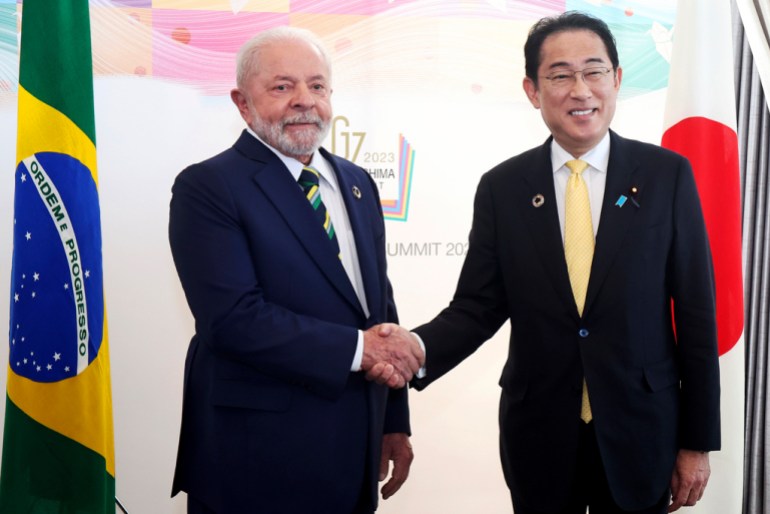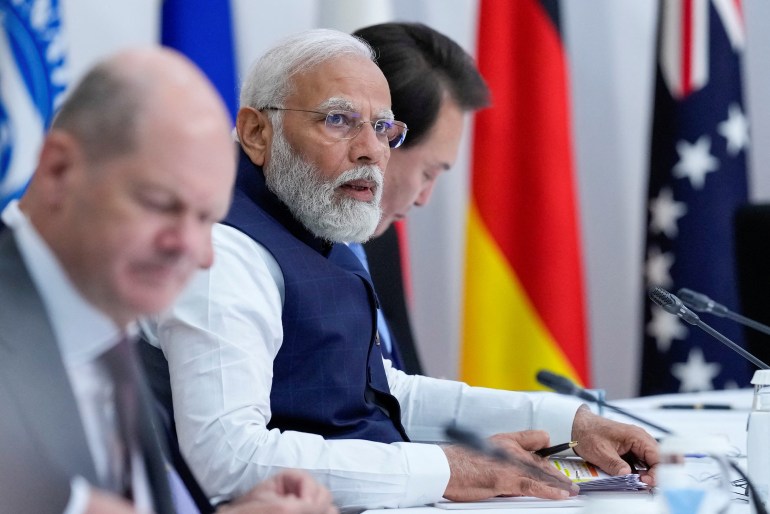Why does the G7 summit have 16 seats at the table?
Japanese PM Kishida has expanded the G7’s guest list as he seeks to boost ties with middle-power countries.

Hiroshima, Japan – The Group of Seven (G7) summit is being attended by more countries than its name suggests.
Japanese Prime Minister Fumio Kishida, the host of this year’s gathering of wealthy democracies, has expanded the event’s guest list as he seeks to boost ties with middle-power countries and those in the Global South.
Keep reading
list of 4 items‘Give sorrow words’: G7 leaders reflect at Hiroshima bomb museum
Zelenskyy attendance at G7 confirmed, set to meet Japan’s Kishida
G7 tightens sanctions over Russia’s war on Ukraine
The Japanese leader’s outreach comes as the forum looks to boost cooperation on global challenges, including Russia’s war in Ukraine, China’s rise, food security and climate change.
How many countries are represented at the gathering?
The G7 currently consists of the United States, Canada, Japan, the United Kingdom, France, Germany and Italy, plus the European Union as a “non-enumerated member,” but the forum has over the years invited participation by non-member countries such as India, Poland and Spain.
This year, leaders from 16 countries, plus the EU, are attending the three-day summit.
Apart from the G7 members and the EU, leaders are attending from India, Brazil, Indonesia, Vietnam, Australia, South Korea and Comoros and Cook Islands – the latter two also representing the African Union and Pacific Islands Forum, respectively, as their current chairs.
Why does the G7 want to expand ties with developing countries?
While the G7 is looking to promote a united front in its efforts to pressure Russia to end its war in Ukraine, most of the international community has declined to take a side in the conflict.
With the exception of Japan, the sanctions campaign against Russia has been a Western-led effort.
While Russia’s trade with G7 countries has plummeted, China, India and Turkey have picked up much of the slack through increased imports of Russian coal, oil and gas. Russia’s economy only contracted by about 2.2 percent in 2022, far less than expected.

Although the G7 is still influential, its share of the global economy has declined from about 70 percent during the 1980s to 44 percent today – meaning that it has limited scope to tighten the screws on Russia without buy-in from the wider international community.
“Kishida wants to get closer to the Global South because currently the G7 approach toward Russia – and China – is somewhat isolated,” Sayuri Shirai, an economics professor at Keio University in Tokyo, told Al Jazeera.
“Many developing and emerging economies, because of their closer linkage through natural resources or the economy with Russia and/or China are very cautious to become part of a G7-led coalition.
“The Global South is important because their market share is growing and their GDP share (PPP, based on purchasing power parity) is more than 50 percent,” Shirai added. “Meanwhile, Japan is ageing and its population is dropping.”
Does this mean smaller and developing countries will have a greater say in global affairs?
Some observers hope this year’s G7 summit will mark the beginning of a greater international role for voices that have been neglected in the past.
In an interview with Nikkei Asia earlier this week, Indian Prime Minister Narendra Modi said he would use the summit to “amplify the voices and concerns of the Global South”.
Ian Hall, the deputy director of the Griffith Asia Institute in Australia, said the G7’s expanded focus reflected a “broader crisis of multilateralism”.
“I do think the outreach is genuine: there is acknowledgement that Global South voices are not always heard and that they need to be, if we’re going to find some way forward on issues like climate change,” Hall told Al Jazeera.

Critics are more sceptical about the G7’s interest in giving the Global South a greater say in the world.
In an analysis released ahead of the summit, Oxfam said that G7 countries are continuing to demand $232m a day in debt repayments from low and middle-income countries despite owing $13.3 trillion in unpaid aid and funding for climate action.
“Wealthy G7 countries like to cast themselves as saviours but what they are is operating a deadly double standard – they play by one set of rules while their former colonies are forced to play by another. It’s do as I say, not as I do,” said Oxfam International interim Executive Director Amitabh Behar.
“It’s the rich world that owes the Global South. The aid they promised decades ago but never gave. The huge costs from climate damage caused by their reckless burning of fossil fuels. The immense wealth built on colonialism and slavery.”